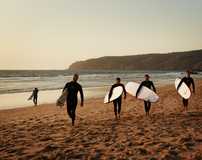July/ August 2014 / Portugal
Expo 75: Cascais
Cascais, Hayama, Aegina, Sai Kung and Outer Sunset: five commuter towns with distinct personalities.
Blessed by geography and sunny skies, Lisbon and its surrounding suburbs are home to roughly a quarter of Portugal’s 10 million residents. Much of the metropolitan landscape, however, is blighted by urban sprawl. Dull apartment blocks in dormitory towns dominate the scenery and on weekday mornings they disgorge commuters onto roads to clog the capital’s streets.
Happily, one community bucks this depressing trend: Cascais.Located west of Lisbon at land’s end where the Tagus estuary empties into the Atlantic, the former fishing village is today home to 35,000 people. Its architecture is a mix of older palatial homes and low-slung residences from the 1960s and 1970s in neighbourhoods where hibiscus blooms and stone pines provide shade for passers-by. In half an hour, people are whisked to work in Lisbon aboard silver-and-yellow trains that follow the Linha de Cascais, a 26km coastline-hugging route that gives riders time to digest the morning papers or daydream as they watch cruise ships and oil tankers bound for port. Some dwell on post-work activities, lured by a string of sandy beaches that sit just east of Cascais and within easy walking distance of train stops.
Many choose not to commute, preferring the clean air and leisurely lunches of freshly caught seafood paired with crisp local white wines. Brazilian Adriana Novais, a resident of 17 years who bears a passing resemblance to Sonia Braga, swapped big-city life in Belo Horizonte for the peace and quiet of Cascais. Her interior-design store, Batik, is just up the hill from City Hall and the main square, which is lined with palms and paved in calçada portuguesa cobblestones that form a mesmerising wave-like mosaic. “The pace is more relaxed here than Lisbon. Every day feels like the weekend. And the light is fantastic, unlike anything in Brazil. It’s bright white so you can’t get by without a good pair of sunglasses,” says Novais, gesturing to the panorama outside her shop that takes in the small bay and winding coastline.

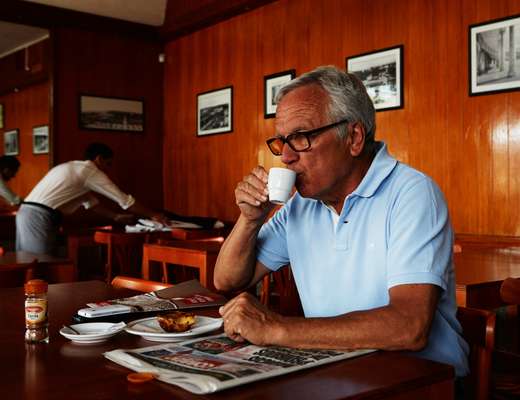
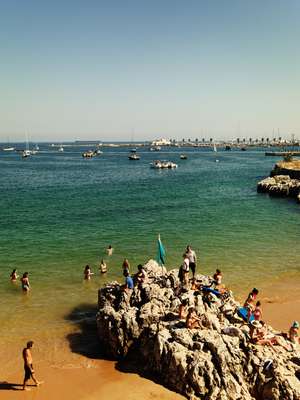
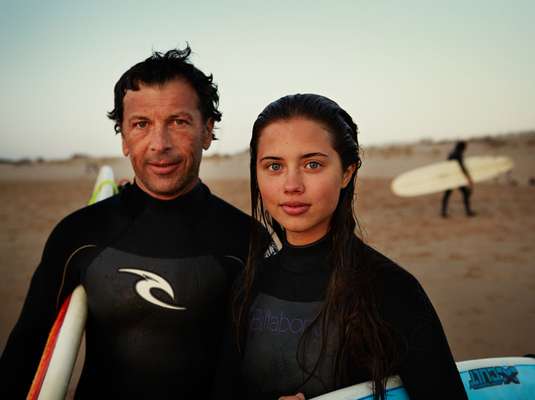
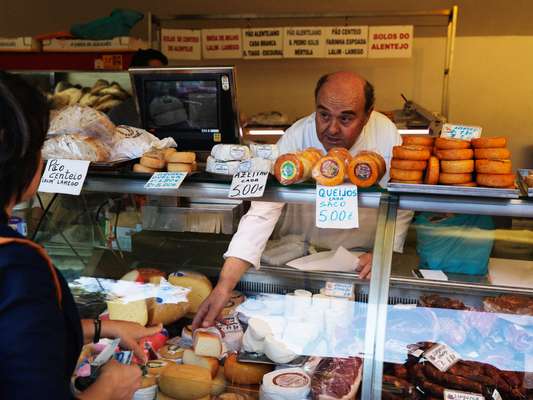
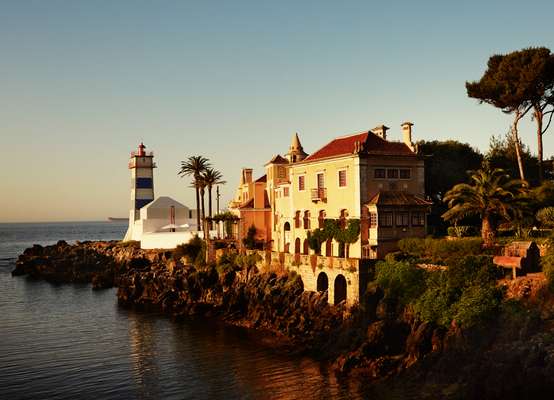
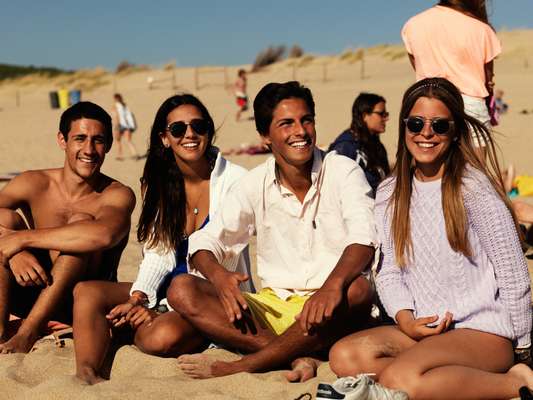

Below the embankment in front of Novais’ boutique, a fisherman noisily hoses down containers that earlier were filled with the day’s catch brought in by a boat. Sea bass and sea bream, gooseneck barnacles and octopus are among the varieties fished and they quickly find their way to the town’s covered market where locals select the best-looking specimens to take home and cook. Sharing the space are stalls selling local produce, bread and artisanal cheeses such as Azeitão made from sheep’s milk. An old hand at the market is Reinaldo Tomaz, a Cascais native who works at a local estate agent. “In June the sardines will be ready. They are still fattening up in the ocean so it’s best to wait,” advises a well-tanned Tomaz before taking a bite from a traditional pastel de nata custard tart and sipping his late-morning espresso.
Tomaz’s office is in Estoril, the tiny parish that abuts Cascais to the east. Together, the two locales have earned a reputation as a safe haven for those in search of a relaxed existence ever since the Portuguese royal family started to holiday here in the late 19th century. Later, exiled European monarchs settled in the area, including Italy’s last king, Umberto II. “The water is clean along the shore, calm, and the winters are mild – so what’s not to like?” adds Tomaz.
Even Italians of modest backgrounds have uprooted to enjoy the life. Simona Iucci, together with husband Ulrico Bracci and their two daughters, moved in 1996 after stints in London and Rome working full-time jobs. Now they work from home: she makes industrial-looking lamps for her start-up brand Oowl, while Ulrico trades stocks on the German and US exchanges from his computer when not taking a break to surf.
“It feels like Italy back in the 1950s,” says Iucci. “People take their time, you don’t feel rushed. And the beach is three minutes away.” Foreign residents from French pensioners to British, American and German employees and their families are common and there are international schools in the vicinity.
The health conscious, meanwhile, are spoilt for choice. In the mornings before work and on weekends, Cascais joggers invade the “Paredão”, a 3km concrete promenade that runs above the sea and below the rail line and is adorned with exercise stations for pull-ups and other limb-stretching activities. Up the coast by way of a cycling path is Guincho Beach, where surfers brave the cold waters and untamed waves.
When monocle visits on a weekday afternoon at 17.00, barefoot residents are walking out from behind the sand dunes, many having just changed out of their work uniforms and into wetsuits. One is Sérgio Taniça, a financial analyst who looks like he might be Tom Cruise’s long-lost Portugese twin (see page 255). “I’m out here to unplug after staring at a computer. No other spot in Europe can match this for waves.”
Perched above the beach is Muchaxo, where surfers rent boards and locals unwind with a beer in the original 1960s wood bar with tables made from tree trunks taken from the nearby Serra de Sintra. One regular is local architect Fernando Hipólito. “It’s a place from another era, something to treasure,” he says. At his office, Hipólito notes that Cascais has a cultural offering that punches well above its weight.
Beyond a few touristy streets frequented by foreign daytrippers in search of gelato at Santini there sits a small oasis of museums. One is Casa das Histórias, a salmon-red concrete structure punctuated by two chimney-like towers designed by Eduardo Souto de Moura and dedicated to Portuguese artist Paula Rego. Close by is Pousada de Cascais Cidadela, a 16th-century coastal fort now turned into a hotel and exhibition space where galleries and artists’ ateliers reside. “It’s hard to find a place offering so much in a compact space,” says Hipólito. “Cascais is one.”

